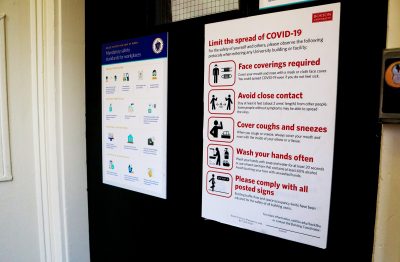
The Boston University Student Government is introducing its COVID-19 University Oversight Committee this Spring to monitor problems with BU policies and actions regarding the pandemic.
The ad hoc committee has stated its intent to report issues with BU’s COVID-19 response to the administration as well as the Senate to find solutions, according to the committee website.
Sen. Ezra Bale, a senior in the College of Communication and chairman of the CUOC, said the committee’s process involves investigating claims brought to their attention by students and faculty.
“We gather all that information and then as a committee, we start to brainstorm,” Bale said. “What are ways we can go about fixing this problem? Is there anything we can do to fix this problem?”
Bale said the committee will then send a written report to the BU administration and release an abridged version of their statement with proposed solutions to the public.
He added the committee was formed with the best interest of students and administration in mind.
“We see these are some things that you’re doing, or that it looks like you’re doing, that could potentially open you up for liability,” Bale said. “As students of this university, we don’t want that to happen to you because if the University suffers, we suffer.”
Bale said some of the committee’s methods were inspired by the Credit-No Credit initiative used last Fall.
“No matter what, our approach when we talk to the administration is to go from a position of peace,” Bale said.
Vice Chairman Richard Segalman, a sophomore in the College of General Studies, said the procedure for communicating with administration is determined on a case-by-case basis.
For example, if a student’s UPS item were missing, the committee may speak to the Residence Life office or with the dorm staff directly, Segalman said.
“We don’t have anybody particular in mind because every case is a little bit different,” Segalman said. “But we try to reach out to the administrative folk who are kind of in the realm of what we’re dealing with.”
The committee announced on Twitter the first resolution they will introduce in the Senate, which will be on BU’s recent workplace adjustment policies for library staff.
Social Media and Communications Coordinator Vivian Dai, a freshman in the College of Arts and Sciences, said she attended a meeting with union representatives to discuss the issue.
“When we heard this, we thought this is really egregious to do to your employees,” Dai said.
The resolution, she said, will be introduced in the first Senate meeting Monday and will be promoted on social media beforehand.
Sen. Savannah Majarwitz, a junior in CAS, said the committee’s main priority is improving communication with administration.
“Transparency is the biggest thing we want to offer,” Majarwitz said, “because I think that’s really what’s going to be the biggest thing that I think the student body wants to see from the University.”
BU Spokesperson Colin Riley said the University welcomed communication with the committee as a way of getting feedback from the student body.
“It’s always good to have student representatives and student concerns,” Riley said. “It’s one of the things I always say when we’re in the office internally, we really want to know what their take on things is.”























































































































